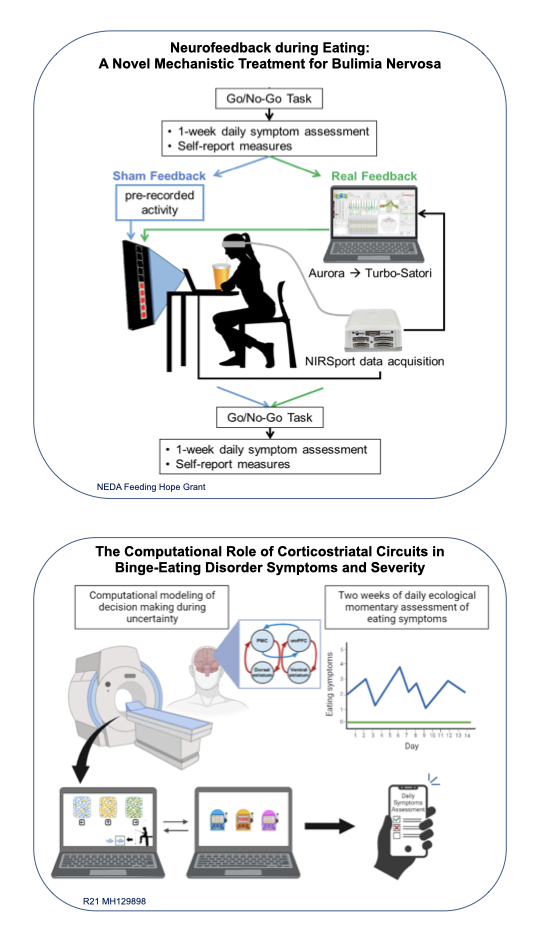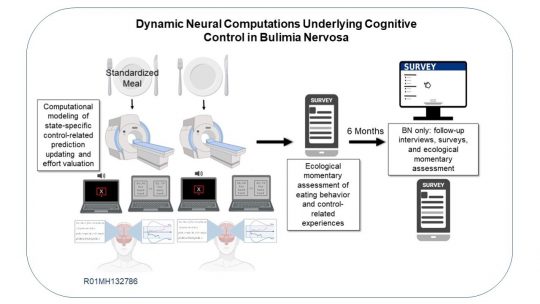Research Overview
Our lab is focused on understanding the cognitive, neural, and computational mechanisms underlying self-regulatory control and identifying how these processes go awry in eating disorders. We are particularly interested in identifying how changes in states (internal/motivational or external/environmental) may abnormally influence control-related learning and decision-making in individuals with binge eating, purging, and extreme dietary restriction. We leverage a multi-modal approach that integrates neuroimaging and computational modeling, as well as experimental tasks from cognitive neuroscience and neuroeconomics. Our ultimate goal is to identify precise targets for new interventions and predictors of who will benefit from which treatments.
Some of the complex questions we’re exploring include:
How can seemingly incompatible characteristics, such as out-of-control impulsivity and compulsive perseverance, co-occur in individuals with eating disorders?
Do the brains of people with eating disorders process and learn about emotions, satiety, and other body-state signals very differently than the brains of people without eating disorders? If so, how does that impact subsequent decision-making?
Could both willingness and ability to control behavior and emotions be altered in people with eating disorders?

Laura A. Berner, PhD
laura.berner@mssm.edu
Current Projects
Several of our studies aim to clarify how and by what mechanism cognitive control fluctuates across fasted and fed states in bulimia nervosa, potentially perpetuating the cyclical nature of the disorder. In addition, we are developing an intervention that trains individuals to change their own brain activation in cognitive control circuits using a portable imaging technology called fNIRS. Finally, we are testing whether abnormal connectivity within and between brain circuits during decision-making could explain why binge-eating episodes are both impulsively initiated and inflexibly persistent, as well as promote more severe forms of binge-eating disorder. Click on the images below to learn more about each of our ongoing studies.
Meet the Team
Lab Director

Laura A. Berner, PhD
Dr. Berner is an Associate Professor of Psychiatry at the Icahn School of Medicine at Mount Sinai, where she is the Director of the Center for Computational Psychiatry and a principal investigator in the Center of Excellence in Eating and Weight Disorders. She is clinically trained as a psychologist, with a PhD from Drexel University that complements her undergraduate training at Princeton University in behavioral neuroscience and her postdoctoral training at UC San Diego in cognitive neuroscience and functional and structural neuroimaging. Her research combines neuroimaging, neuroendocrine, behavioral, and psychological tools with computational modeling approaches to determine how the process of engaging control to guide adaptive decision-making may go awry in eating disorders. Her work has been funded by private foundations, including the Brain and Behavior Research Foundation, and federal funding from the NIH.
Postdoctoral Fellows
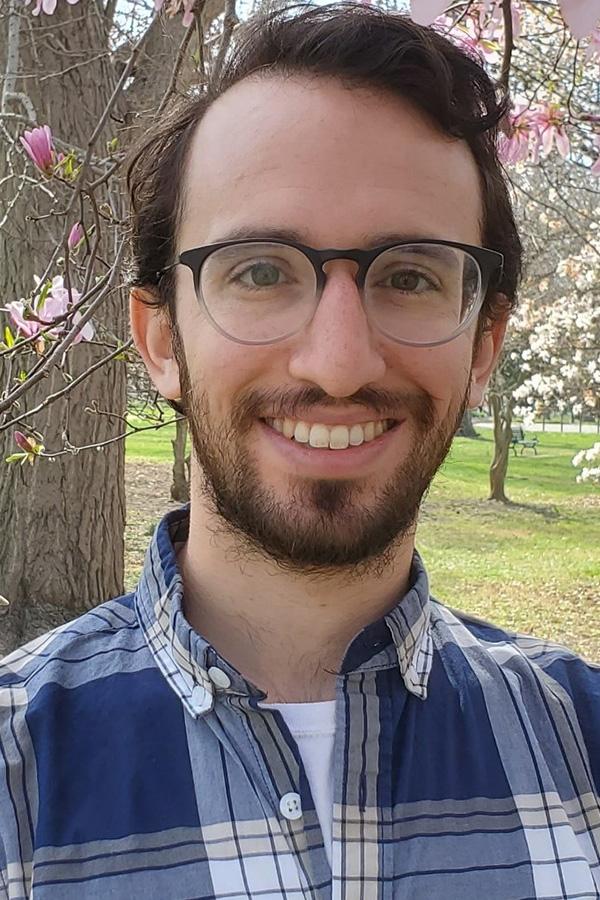
Blair Shevlin, PhD
Blair is a postdoctoral fellow at ISMMS co-mentored by Laura Berner and Xiaosi Gu. He graduated from Goucher College with a bachelor’s degree in Psychology and then received his master’s degree in Experimental Psychology from Towson University. In 2022, he earned his PhD in Decision Psychology from The Ohio State University. Dr. Shevlin’s research examines the role of value, attention, and motivation in everyday decisions. He specializes in computational modeling, incorporating theoretical perspectives from psychology, neuroscience, and economics to study how people approach their decisions in a variety of contexts.

Saren Seeley, PhD
Dr. Seeley is a postdoctoral fellow at ISMMS. She joined the Berner Lab to continue her training in computational psychiatry and neuroimaging, after completing the Psychiatry Department’s NIMH T32 postdoctoral fellowship in clinical neuroscience 2021-2024. She is clinically trained as a psychologist, with a PhD from the University of Arizona and BA from CUNY Hunter College. Her research uses functional MRI to understand the neural computations involved in learning and decision-making, and how these computations contribute to thoughts and behaviors that feel difficult to stop or control (e.g., in eating disorders, prolonged grief disorder, or PTSD). Her research has been funded by the Brain and Behavior Research Foundation and the National Institute on Aging.
Research Coordinators

Riley Macks
Riley graduated from the University of Pennsylvania in 2024 with a B.A. in psychology and a minor in neuroscience. As an undergraduate, her research involvements have focused on the gut-brain axis, behavioral health interventions for gastrointestinal disorders, and community-based interventions for autism in young children. In the lab, she coordinates a study investigating how fasting and feeding influence cognitive control in women with bulimia nervosa. She is particularly interested in broadening her knowledge of health psychology and hopes to work with adolescents in the future. Riley plans to pursue a Ph.D. in clinical psychology as well.

Sila Sozeri
Sila graduated from UCLA in 2025 with a B.A. in Psychology, a minor in Brain and Behavioral Health, and specialization in computing. In the lab, she is coordinating a study examining how real-time neurofeedback may help people with bulimia nervosa regulate binge-eating and purging behaviors. Her research interests include self-destructive behaviors, neural underpinnings of emotion dysregulation, and using computational psychology for a transdiagnostic understanding of psychiatric disorders. Sila plans to pursue a Ph.D. In Clinical Psychology.
Research Associate
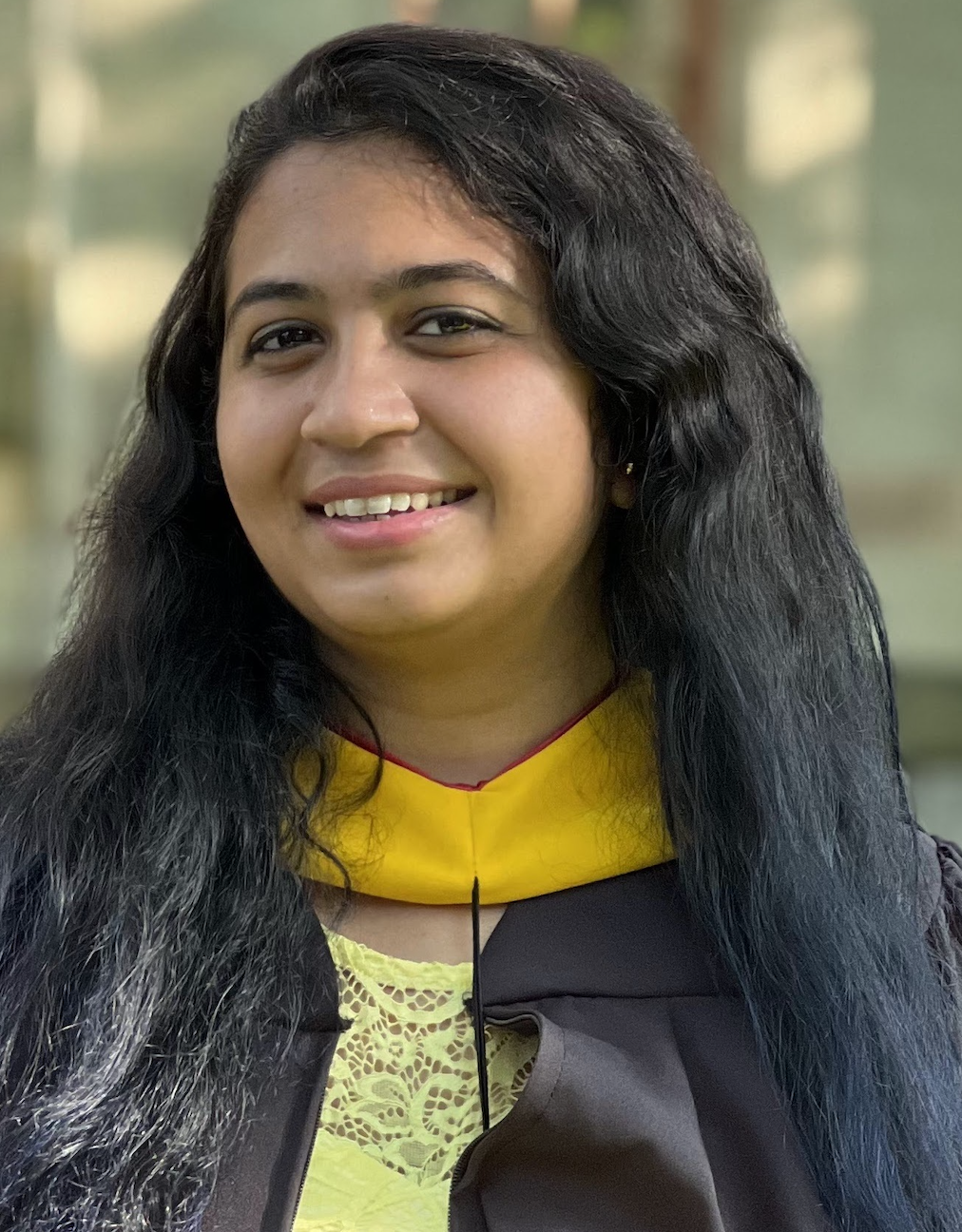
Anusha Phadnis
Anusha received her Bachelor’s degree in Information and Communication Technology from India and worked in the software industry for a while. She then pursued her interest in Scientific Computing at the University of Pennsylvania and received her Master’s degree in 2023. She is passionate about applying computational modeling methods to research problems in psychiatry. She wants to harness the quantitative power of scientific computing to advance the research on diagnosis and treatment of psychiatric disorders. She plans to pursue a PhD and then a research career in this exciting field of Computational Psychiatry.
Volunteers
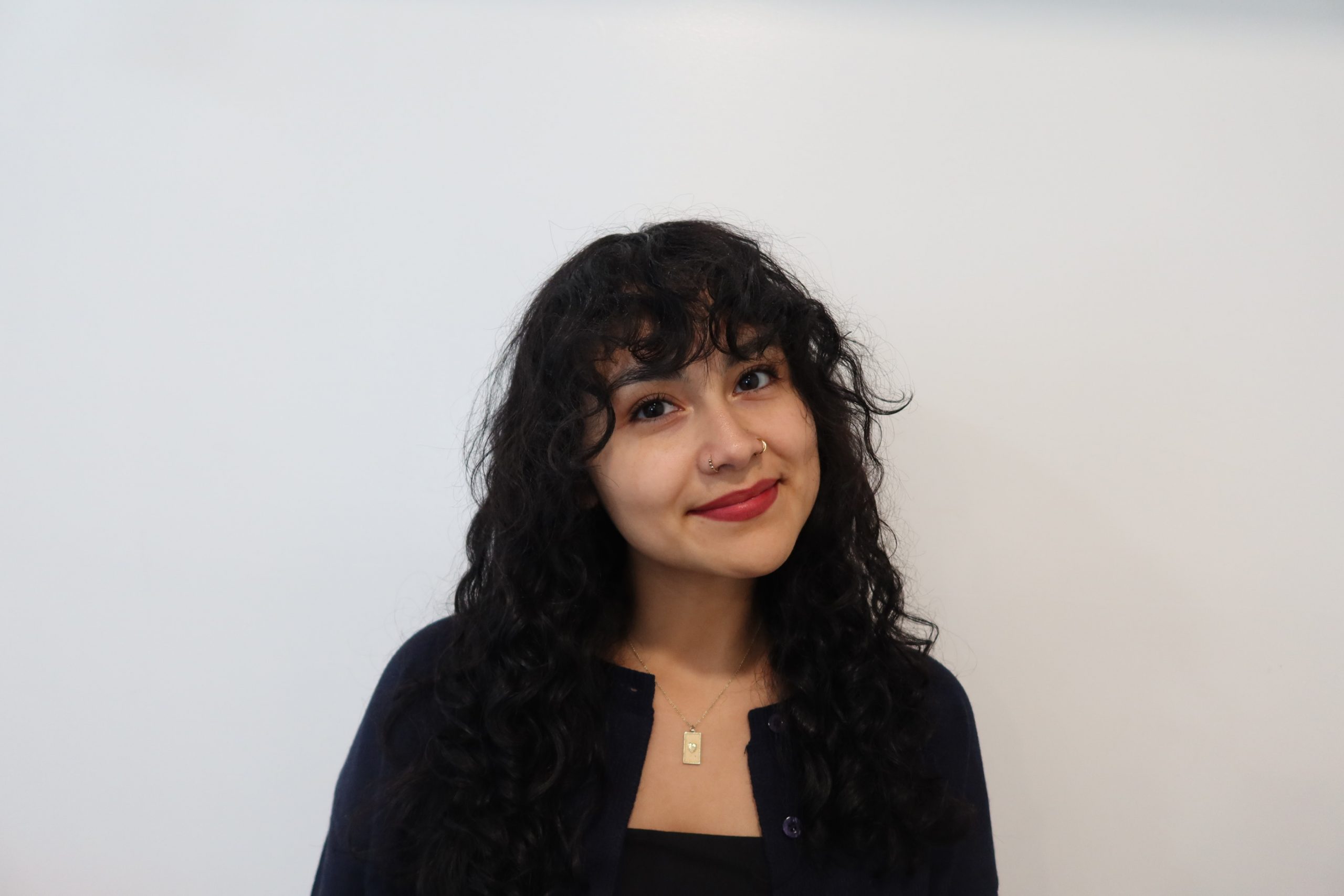
Sugeily Alvarez
Sugeily is a graduate student in the Behavioral Neuroscience Master’s Program at Queens College, and holds a B.A. in Psychology. Her interests include brain health disparities, cross-cultural influences on cognition, and personalized approaches to psychological assessment and care. She plans to pursue a PhD in clinical or health psychology to continue research that advances more inclusive neuropsychological practice.

Gianna Badamo
Gianna is a junior at New York University, majoring in Psychology and aspiring to attend medical school. She is deeply interested in psychopathology and hopes to explore how psychological and biological factors interact in mental and physical health. Through her studies, she aims to develop a comprehensive understanding of human behavior and apply it to compassionate, evidence-based medical care.
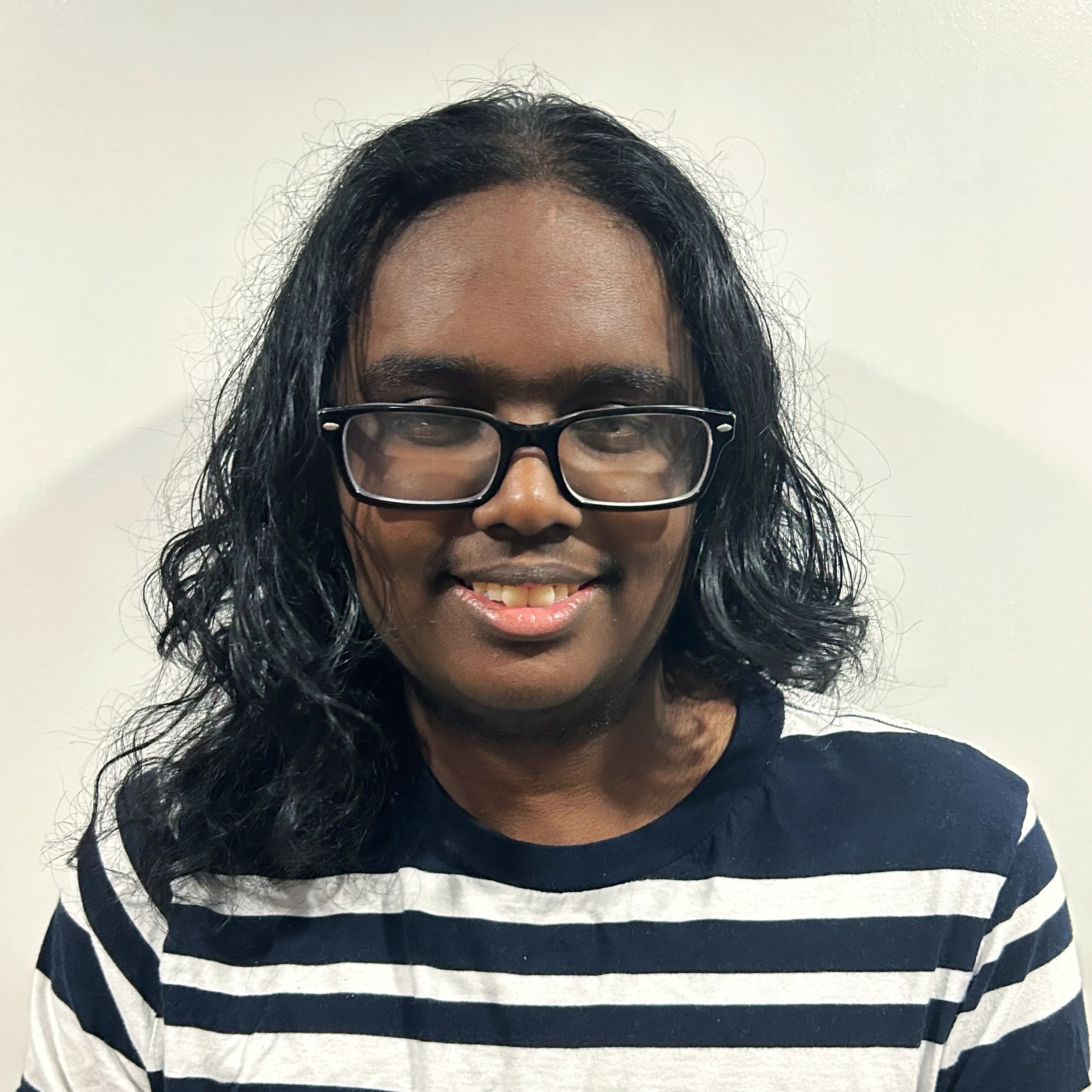
Fran Ramakrishnan
Fran is a senior at CUNY School of Professional Studies majoring in Psychology with a minor in Mental and Behavioral Health. He is interested in the neural pathways of cognitive and emotional dysfunction in psychopathology, especially in the context of self-control and social decision-making. He hopes to pursue a Ph.D. in Clinical Psychology.

Maria James
Maria is a sophomore at Barnard College majoring in Psychology. She is passionate about developmental psychology and psychopharmacology, and is particularly interested in exploring the field of nutritional psychiatry. Maria hopes to pursue an M.D. and a career in psychiatry in the future.

Tianyu Gu
Tianyu is a first-year master’s student in the Clinical Psychology program at Teachers College, Columbia University. She hopes to pursue a Ph.D. in cognitive psychology/ neuroscience. Tianyu is passionate about studying memory, psychiatric mood disorders, and applying fMRI and data analysis techniques to better understand the neural mechanisms underlying cognition and emotion.

Morgan Dreher
Morgan is a senior Clinical Psychology major and Sociology minor at Macaulay Honors College at Hunter College. She is passionate about understanding severe mental illness across development and improving early intervention for children and adolescents. She is also interested in forensic mental health, particularly the assessment and treatment needs of adolescents and adults with complex clinical presentations. Morgan plans to pursue a PhD in Clinical Psychology.

Emily Ng
Emily is a junior at Stony Brook University pursuing a B.A in Psychology with a minor in Studio Arts. She hopes to pursue a masters in clinical art therapy and mental health counseling. Emily is passionate about studying developmental psychology, psychiatric mood disorders, and advocating for culturally diverse mental healthcare.
Lab Alumni
Yagmur Buyrukbilen
Previous role at the lab: Volunteer
Jessica Qiu
Previous role at the lab: Clinical Research Coordinator
Current position: PhD (Clinical Psychology) student at American University
Alexa Krugel
Previous role at the lab: Clinical Research Coordinator
Current position: PsyD (School and Clinical Psychology) student at Yeshiva University
Zoe Dai
Previous role at the lab: Clinical Research Coordinator
Current position: PhD (Clinical Psychology) student at Texas A&M University
Suzie Shah
Previous role at the lab: Master’s student
Current position: MD/MPH student at University of Miami
Lauren Cody
Previous role at the lab: Volunteer
Current position: PsyD (Clinical Psychology) student at Yeshiva University
Olivia Nilsson
Previous role at the lab: Volunteer
Current position: Research Associate, NYU Langone Child Study Center
Emma Wong
Previous role at the lab: Volunteer
Current position: Undergraduate Research Assistant, The Education University of Hong Kong
Zoe Tan
Previous role at the lab: Volunteer
Maia Chester
Previous role at the lab: Head Clinical Research Coordinator
Current position: PhD (Clinical Health Psychology) student at University of Miami
Bowei Li
Previous role at the lab: Volunteer
Emily Aguilar
Previous role at the lab: Volunteer
Claire Sun
Previous role at the lab: Associate Researcher
Current position: PhD (Brain and Cognitive Sciences) student at University of Rochester
Thalia Viranda
Previous role at the lab: Clinical Research Coordinator
Current position: PhD (Information Science) student at Cornell Tech
Raisa Alam
Previous role at the lab: Master’s student
Current position: Consultant at Empowerly
Siyi (Ice) Lou
Previous role at the lab: Volunteer
Current position: Residential Life Coordinator, Penn State
Serena Yung
Previous role at the lab: Volunteer
Current position: Undergraduate Student, Neuroscience, UC Berkeley
Collaborators
Icahn School of Medicine at Mount Sinai
- Mount Sinai Center for Computational Psychiatry
- Mount Sinai Center of Excellence in Eating and Weight Disorders
- Muhammad Parvaz
- Ki Goosens
- Laurel Morris
- Priti Balchandani
Other Institutions
- The ENIGMA Consortium Eating Disorders Working Group
- Candace Raio
- Andrew Westbrook
- Joanna Steinglass
- Claire Gillan
- Robert Dvorak
- Stephen Wonderlich
- Tanzeem Choudhury
- Joseph Heffner
- The UC San Diego Eating Disorders Treatment and Research Center
- Katia Harlé
- Alan Simmons
- Angela Yu
- Martin Paulus
Please reach out if you are interested in collaborating with or joining the team.
Funding & Awards
R01 MH132786 (PI: Berner)
R21 MH129898 (MPI: Berner and Fiore)
R01 MH126448 (Co-I: Berner)
R21 MH124352 (Co-I: Berner)
ISMMS Friedman Brain Institute Research Scholars Award (PI: Berner)
National Eating Disorders Association Feeding Hope Fund for Clinical Research Grant (PI: Berner)
Brain and Behavior Research Foundation NARSAD Young Investigator Award (PI: Berner)
K23MH118418 (PI: Berner)
Participate in Our Research Studies
Thank you for your interest in our studies! Please read details of our studies below.
Neurofeedback Treatment for Bulimia Nervosa
This study examines whether training people with bulimia nervosa to use certain thought patterns to increase their own brain activation in real-time, called “real-time neurofeedback,” can help reduce their eating disorder symptoms. By participating in this study, you or someone you care about could help advance research on treatment for bulimia nervosa.
If you (or if you know someone who) binge-eat and purge (e.g., self-induced vomiting, misusing laxatives or diuretics or diet pills, exercising intensively and compulsively, or fasting) to control your shape or weight, and are interested in learning more about our research study, please continue to read the study details below.
WHAT IS NEUROFEEDBACK?
Neurofeedback is a non-invasive brain training that is administered via a functional near-infrared spectroscopy (fNIRS) device that records and displays your brain activity in real-time. The purpose of this training is to help you train your brain function. Specifically, we are interested in learning whether this type of brain training will help people with bulimia nervosa reduce their eating disorders symptoms.
WHAT IS FUNCTIONAL NEAR-INFRARED SPECTROSCOPY (fNIRS)? IS IT SAFE FOR ME?
fNIRS is a brain imaging technology that detects brain activity in different areas of your brain using infrared technology. When you are doing an activity and use specific parts of your brain, the blood flow to those brain areas is higher than the blood flow to other areas of your brain. The fNIRS device can detect the “color” of the blood that flows into these specific brain areas; the darker the color, the more active the brain areas are.
This technology does not involve any magnets or radiation and it’s even been used to study babies.
WHAT’S INVOLVED IN THIS STUDY?
- Phone interview to confirm qualification (~15-20 minutes)
- Clinical interviews remotely or at Mount Sinai (~2.5 hours)
- In-person screening and computer tasks (~1.5 hours)
- A neurofeedback session (~1.5 hours)
- Pre- and post-neurofeedback online questionnaires and two weeks of symptom assessments (one week before and one week after the neurofeedback visit; ~3.5 hours total)
- A follow-up remote assessment (~1 hour)
WHY PARTICIPATE?
- Reimbursement for travel.
- Complimentary psychological evaluation.
- Referrals for treatment, if desired.
- Compensation of up to $280 for time.
- Help Mount Sinai researchers better understand and treat binge eating and purging behaviors.
WHO CAN PARTICIPATE?
Females who are currently binge-eating and purging, right-handed, 18-35 years old, and able to attend two study visits in Manhattan.
Neuroimaging Study in Adults with Binge-Eating Disorder
- Currently binge eat (eat an unusually large amount of food and experience a sense of loss of control)
- Are a right-handed and between the ages of 18 and 45
- Are able to attend 2 study visits in Manhattan, New York
- Reimbursement for travel
- Complimentary psychological evaluation
- Referrals for treatment, if desired
- Compensation of up to $230
Study of Control-Related Decisions in Bulimia Nervosa
- In-person screening and computer tasks (approximately 2 hours)
- Two brain imaging visits at Mount Sinai: MRI scans and computer tasks — once after a 16-hour fast and once after a standardized meal that we provide (3.5 hours total per visit)
- Phone interview to confirm qualification (approximately 20 minutes)
- Clinical interviews (these can also be completed at Mount Sinai if you prefer; approximately 2.5 hours)
- Online questionnaires (approximately 1 hour)
- Two weeks of remote, online symptom assessments via ecological momentary assessment (EMA; approximately 3 hours and 40 minutes in total over 2 weeks)
- For participants with bulimia nervosa: a six-month follow-up assessment consisting of remote interviews, online questionnaires, and two weeks of online symptom assessments via EMA (approximately 5 hours in total over 2 weeks)
- Compensation of $500-750 for time
- Reimbursement for travel
- Complimentary psychological evaluation
- Referrals for treatment, if desired
- Help Mount Sinai researchers better understand and treat bulimia nervosa
Females who are right-handed, 18-45 years old, and able to attend three study visits in Manhattan.
If you are interested in participating or learning more about any of our studies, please click here or scan the QR code below to securely provide your contact information, or call 212-659-8799.

Job Openings!
The Center for Computational Psychiatry at the Icahn School of Medicine at Mount Sinai is seeking a full-time Postdoctoral Fellow. Leveraging the rich clinical resources and computational expertise across departments, the Center for Computational Psychiatry is dedicated to deepening our understanding of how mathematical models and the brain’s biology can contribute to what we know about mental health issues such as addiction, eating disorders, autism, and personality disorders.
Click the button for the official job listing for more information.
Lab News
May 2025 – Congratulations to Jess Qiu, Zoe Dai, Alexa Krugel, Lauren Cody, and Suzie Shah on their grad school acceptances! Jess will be heading to the Clinical Psychology PhD program at American University, Zoe will be heading to the Clinical Psychology PhD program at Texas A&M, Alexa will be heading to the School and Clinical Psychology PsyD program at Yeshiva University, Lauren will be heading to the Clinical Psychology PsyD program at Yeshiva University, and Suzie will be heading to the MD/MPH dual degree program at UMiami. We couldn’t be prouder of these 5 future doctors!
October 2024 – New publication in the Journal of Psychiatry and Brain Science: Neurofeedback during Eating: A Potential Novel and Mechanistic Treatment for Bulimia Nervosa
June 2024 – New publication in the Journal of Eating Disorders: Evaluating the predictions of an interoceptive inference model of bulimia nervosa
April 2024 – Congrats to Dr. Berner for her Distinguished Scholar Award from the Icahn School of Medicine at Mount Sinai!
April 2024– New commentary in Biological Psychiatry: Cognitive Neuroscience and Neuroimaging: Restoring Weight and Brain Function: Intrinsic Neural Activity and Connectivity Alterations as State Markers of Adolescent Anorexia Nervosa
April 2024 – Congrats to Maia Chester on her grad school acceptance! Maia will be heading to the University of Miami to begin a PhD in Clinical Health Psychology.
December 2023 – Congrats to Dr. Berner for being accepted as a new Associate Member of the American College of Neuropsychopharmacology!
May 5, 2023 – New publication in Molecular Psychiatry:
March 20, 2023 – Congrats to Claire Sun and Thalia Viranda on their grad school acceptance! Claire will be heading to the University of Rochester Department of Brain and Cognitive Sciences, and Thalia will be going to the Cornell University Department of Information Science (Cornell Tech)!
March 13, 2023 – Congrats to Dr. Laura Berner for the funding of her R01!
December 2, 2022 – Congrats to Dr. Laura Berner for the funding of her R21!

